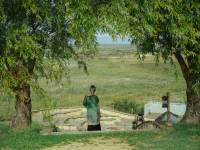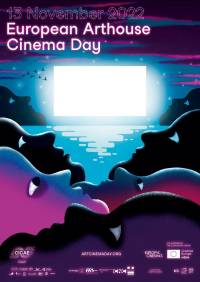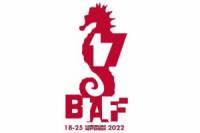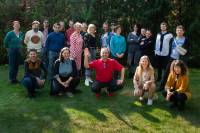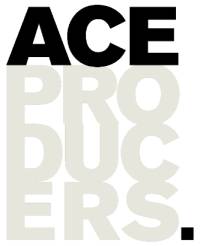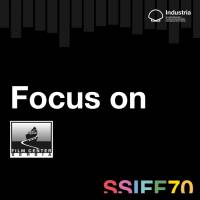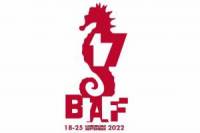Pustnik’s third development residency of the year – part of the Pustnik Screenwriting Network – will take place from October 9th to 16th. Five writers will be working on their sophomore fiction feature screenplays in Izvoranu, a rural setting in Romania.
The selected projects are:
“Disorder" by Giacomo Abbruzzese, Italy
“RARA AVIS” by Octav Chelaru, Romania
“The Last Generation” by Mika Gustafson & Alexander Öhrstrand, Sweden
“A Day in the Life of J: Chapter Phaedra” by Jacqueline Lentzou, Greece
A graduate of Le Fresnoy, Giacomo Abbruzzese’s short films were selected and awarded in international festivals including Clermont-Ferrand, Oberhausen, Viennale, Palm Springs, Mar del Plata, Tampere, IndieLisboa, Nouveau Cinéma Montreal, and Winterthur. He was an artist in residence at Cannes Film Festival Cinéfondation, Cité Internationale des Arts in Paris, and Clermont-Ferrand Short Film Festival. In 2022 he was nominated for a César with his documentary America and also finished shooting his debut feature Disco Boy, starring Franz Rogowski.
Octav Chelaru is a self-taught Romanian director. He has written and directed five short films; his two most recent, Black Clothes (2017) and The Parallel State (2020), both premiered in competition in Locarno. His debut feature film, the Romanian-German-Serbian co-production A Higher Law (2021) was in competition at Transilvania IFF and selected in Thessaloniki IFF, Goa IFF and Ghent IFF.
The writing duo Mika Gustafson & Alexander Öhrstrand co-wrote the feature film Sisters, currently in post-production and set to premiere in 2023. A Bachelor in film directing from Valand film academy in Göteborg, Sweden, Mika’s debut documentary Silvana won the Swedish National film award. Apart from co-writing Sisters and The Last Generation with Mika Gustafson, Alexander Öhrstrand is a successful actor and also develops theatre plays.
Having directed six films until now, Jacqueline Lentzou’s work touches upon non-traditional family systems and their consequences. Retrospectives on her full bodywork have taken place in Montreal, Vienna, Porto and Ghent and she is the New York Onassis foundation fellowship recipient for 2022. Jacqueline is the recipient of numerous awards, including the Leica Cine Discovery Award by Semaine de La Critique for Hector Malot: The Last Day of the Year (2018), as well as the Grand Prix in Reykjavik IFF and Sevilla Film Festival for Moon, 66 Questions (2021), her debut feature which premiered in Berlinale Encounters Competition.
At different stages in their writing process, the residents will take advantage of the peaceful and secluded environment to reflect on their projects and work with Pustnik’s guest consultants – producer Bianca Oana and psychotherapist/narrative consultant Delia Vasile.
The October residency caps off Pustnik’s first year of extended support for emerging filmmakers.
***
About Pustnik:
Pustnik is a year-round programme that aims to create an environment dedicated to peace of mind and clarity of thought, away from modern pressures. Pustnik is also a growing network of film professionals and a community whose aim is to ease and encourage collaboration across the international cinema industry. Starting with 2021 Pustnik has begun a new cycle: a series of three development residencies dedicated to both new participants and alumni working on their first or second feature films.
For more information:
www.pustnik.com
www.facebook.com/pustnik
Andreea Pătru – This email address is being protected from spambots. You need JavaScript enabled to view it.
Pustnik is organized by T.E.T.A Association
TETA is an NGO founded in June 2006 with the purpose of developing cultural activities and alternative education to stimulate cultural revival within overlooked communities. TETA also produces films and theatre performances.
Cultural program co-funded by the Administration of the National Cultural Fund (AFCN), Romanian Filmmakers’ Union (UCIN), Dacin Sara, French Institute Romania
Partners: European Short Pitch, National University of Theatre and Film "I.L. Caragiale" - UNATC Bucharest
Media partners: Film New Europe, Films in Frame, All about Romanian Cinema - aarc.ro
The program does not necessarily represent the position of the Administration of the National Cultural Fund. AFCN is not responsible for the content of the program, nor for the manner in which the results of the program might be used. These are entirely the responsibility of the beneficiary of the grant.
Submit your creative feature-length documentaries, factual series and non-fiction VR and transmedia projects from the CEE region in development, production and post-production to the 12th edition of the East Doc Platform (March 24-30, 2023). The East Doc Platform 2023 will take place at the French Institute in Prague, organized by the Institute of Documentary Film in association with One World Film Festival.
The East Doc Platform is the largest co-production, funding and distribution platform tailor-made for Central and East European documentaries. Every year, we connect European filmmakers with key decision makers - producers, broadcasters, distributors and festival programmers from all over the world.
Dates: March 24-30, 2023
Where: French institute in Prague, Czech Republic
Application deadline: November 13, 2022
>> APPLY NOW (free of charge)
Save the Date and join the Facebook event
What projects are we looking for? Creative feature length documentary films (creative story/character-driven), factual series, and non-fiction transmedia (interactive factual, VR/AR) projects from Central and Eastern Europe in development, production and postproduction stage. The selection is also open to the international productions with projects thematically bound to the CEE region.
East Doc Forum: Pitching for Central and East European creative documentary projects in development or in production stage, including factual series. Participation includes five day-long pitch training and preparation, networking opportunities and individual meetings with invited decision makers.
East Doc Interactive: A three day-long workshop with consultations and networking opportunities for documentary projects with VR and interactive elements in development or in production.
East Doc Series: A part of the East Doc Forum, a three day-long pitch training and consultations, with pitch and networking opportunities for documentary series projects in development or in production.
East Doc Market: Pre-arranged one-on-one meetings with decision makers for documentary projects in production and post-production.
Since 2001, more than 300 documentary films have been completed with the direct support of the East Doc Forum, including award-winning Over the Limit, A New Shift, When the War Comes, Sofia’s Last Ambulance, Ukrainian Sheriffs, The Russian Job, Domino Effect and Rabbit a la Berlin.
The East Doc Platform is organized by the Institute of Documentary Film in association with One World International Human Rights Documentary Film Festival.
Find more information including the application HERE.
We are looking forward to receiving your projects!
OUR POSTER
The poster is being adapted to several languages and can be found in the download area of your Cinema Area on our website. You will also find the logos updated in the languages and soon an updated social media kit that we encourage you to use for your communication surrounding the European Arthouse Cinema Day on Sunday 13 November 2022.
We are happy to inform you that the registrations for the European Arthouse Cinema Day 2022, taking place on Sunday 13th November are now open.
The registration comes also with few updates on our website, for which we would like to give you some instructions here below.
Creating an account for the Cinema Area
Each participating cinema (or company, in case you own/manage multiple cinemas) will have to register and create an account. Please note that only one account is needed to manage more cinemas. Please register with your company name. You can add later the cinemas in your listing.
Once the registration is completed, you will receive an automatic email asking you to confirm your registration. At this point, you will be able to log into your dashboard in the cinema area, with the name and password given during the registration process.
Your Cinema Area
In your cinema area you will have access to a dashboard, where you can add the cinemas to your profile, manage your listing, update the information for the cinema(s) at any time, and to the downloads page.
You can either add a cinema from the list of cinemas who participated in 2021, by selecting the country, the city and the name of the cinema; or, you can register a new cinema in case you can't find it already in the list, and completing all the information requested.
For additional information, please contact: This email address is being protected from spambots. You need JavaScript enabled to view it.
BIAFF Film festival closing ceremony took place on 25 September, at Cinema Apollo
Festival Jury awarded prizes in three competition sections – Feature Films and Short Films.
BIAFF 2022 international competition section’s Jury consisting of five members – Lech Majewski (Poland) – Head of Jury, Carmen Grey (Germany), Lasha Khalvashi, Nino Basilia, Gela Babluani (Georgia), awarded the following prizes:
- Best Film – “Klondike”, Maryna Er Gorbach, Turkey/Ukraine, 2022
- Best Film Director – Maryna Er Gorbach for “Klondike”, Turkey/Ukraine, 2022
- Best Actress – Mariam Khundadze in “Room of My Own”, Soso Bliadze, Georgia, Germany, 2022
- Best Actor – Amir Aghaee for “Four Walls”, Bahman Gobhadi, Turkey/UK, 2021
- Jury Special Mention – „Herd Immunity“, Adilkhan Yerzhanov, Kazakhstan/France, 2021 and “Room of My Own”, Soso Bliadze, Georgia/Germany, 2022
BIAFF 2022 Short Film competition section’s Jury consisting of – Zurab Tsintskiladze (Georgia), Ileana Stanculescu (Romania), Tornike Gogrichiani (Georgia), awarded the following prizes:
- The Best Short film – “It’s quiet here”, Novruz Hikmet / Olena Podolianko , Ukraine, 2022
- Jury Special Mentions - “Axel”, Levan Uchaneishvili, Georgia, 2022 and “Nothing To See Here”, Nicolas Bouchez, Portugal, 2022
Prize of Jury of Batumi Cinemalover’s Club (Roi Abuselidze, Anna Oromtsadze, Dachi Mejidov) – was awarded to two short films:
- “Easter”, Nikoloz Verdzadze, Georgia, 2022; 25 min.
- “Ronin’s Confession”, Giorgi Khukhunaishvili, Georgia, 2022; 10 min.
BIAFF 2022 Life time Achievement awards for contribution to cinema was granted to:
- Lech Majewski (Poland)
- Tengiz Archvadze (Georgia)
- Zurab Tsintskiladze (Georgia)
Festival Supporters – Embassy of Switzerland, French Institute, Embassy of Italy, Embassy of Sweden, Embassy of Lietuva, Batumi Puppet Theatre, GNTA
Cinema APOLLO, hotel “Admiral“, Hotel “Downtown”, Hotel “Bel Mare”, company ART ITALY GROUP, Mareteli Friends Winery, Marketing company “SHINDI”, Komuna Hostel & Hotel, “ReformerFitness”, Restaurant “Shemoikhede”
Festival Media Partners – Georgian Public Broadcaster, Radio Fortuna/Fortuna+, Adjara TV, Batumi TV, Podcast Batumi, Film New Europe (www.filmneweurope.com), AT.GE, Newspaper BATUMELEBI, netgazeti.ge, CinExpress.ge
Festival partners for presenting films – Matchfactory, New Europe Film Sales, Arizona Productions, Hanwayfilms, DirectoryFilms, ArtHood Entertainment, Asian Shadows, Irimage
Contact information:
Tel: 599-482181, This email address is being protected from spambots. You need JavaScript enabled to view it., For accreditation – This email address is being protected from spambots. You need JavaScript enabled to view it.
Web: www.biaff.org, www.facebook.com/biaffbatumi
SOFA ON CLOUD NINE – SCHOOL OF FILM ADVANCEMENT BACK ON SITE IN WARSAW WITH LARGEST, MOST DIVERSE SELECTION OF PARTICIPANTS EVER
Press releases 29-09-2022SOFA – SCHOOL OF FILM ADVANCEMENT, the training programme aimed at strengthening regional film industries across Europe with a focus on Eastern partnership, is pleased to announce the launch of its ninth edition and unveil its project selection for 2022-2023. The first SOFA workshop, running through September 30th, just kicked off on Sunday evening just outside the Polish capital Warsaw.
After two years going virtual with a fully online program, an expanded SOFA returns and is excited to reveal a new, larger line-up of 16 projects and 20 participants, composed of up-and-coming film industry executives, curators, and cultural managers from 17 countries including Ukraine, Belarus, Poland, the Czech Republic, Georgia, Azerbaijan, Bulgaria, Croatia, Hungary, Montenegro, North Macedonia, Lithuania, Bulgaria, Denmark, Bangladesh, Switzerland and Germany. In the opening session, participants agreed and emphasized together that, given the fraught political situation in many of their countries, the need for creative cooperation across borders between the Eastern Partnership countries and the EU is more important now than ever.
SOFA’s 2022-23 project selection includes business and institutional projects focused on environmental activism, mental health in the film industry, film education, indigenous cultures, sustainability, inclusion and accessibility, and the preservation of independent film journalism and criticism as well as remote learning. Projects are selected based on their quality and practicability in terms of evolving or strengthening the film culture and industry in their countries of origin and should carry the ambition to foster structural change or new forms of cooperation in the regional film landscape. Projects include Cinema Nutsa from documentary filmmaker and 2021 Sundance/Berlinale alumna Salomé Jashi (Georgia), aiming to establish the very first arthouse cinema in Tbilisi, the creation of a C.A.P. - Council for Audiovisual Production in Azerbaijan by Gunel Gadirova, Sane Cinema from Louise Højgaard Johansen (Denmark/Czech Republic), an international consultancy focusing on mental health in the film industry and developing tools for organisations & individuals. As well as Warszawa\Praga Studio, a digital media & video production facility connected to the redevelopment of a gritty neighbourhood in Warsaw, and MoreFilm.Fun by Olga Zhurzhenko and Sia Titova (Ukraine/Poland), a distribution company focused on children’s content.
SOFA’s intensive one year program, comprised of three focused workshops complimented by regular virtual sessions, aims to support, nurture, and bring to fruition the “dream projects” of the participants, who apply with a specific project plan in the fields of distribution, education, funding, exhibition, curation, or criticism. The projects are then tracked over the course of the year, with each of the intensive workshops focusing on project development, marketing strategies, as well as financing and business plans.
SOFA Director Nikolaj Nikitin said about the specific focus of this year’s edition: “Projects supporting activism, free expression or the establishment of institutions that help evolving pan-regional cultural industries are highly valued by SOFA this year. In challenging times, together with the development of new companies and independent institutions, it’s a clear priority to support projects that conceive of film and AV-Media as a force for free speech, resistance and strengthening through our common work the civil society.”
Unlike most pan-European professional training programs, SOFA isn’t geared specifically towards filmmakers, producers or directors. But by connecting aspiring young executives to international experts as well as to each other with an eye towards the East, SOFA aims to strengthen networks and mutual understanding between the future decision makers who can determine the shape of the economic and cultural landscape of film in their home countries. “The heart of SOFA is to nurture and connect the human infrastructure that can support
a positive, cooperative impact of a film industry and culture across Europe and further.” added Berenika Partum, SOFA Project Manager (Poland/Hungary).
SOFA experts are established and influential decision makers selected to fit participants’ specific projects including Ewa Puszczyńska (Poland), producer of COLD WAR and IDA, Tine Klint (Denmark), founder of sales agent and aggregator LevelK, Jan Naszewski (Poland) of New Europe Film Sales, Iza Kiszka-Hoflik IKH Pictures Production (Poland), Michal Bregant (Czech Republic), CEO of Národní filmový archiv, Prague, and President of ACE - Association des Cinémathèques Européennes, Karel Och (Czech Republic), Artistic Director of Karlovy Vary International Film Festival, Marit Van Den Elshout (The Netherlands), former Head of IFFR Pro, Jay Rinsky (US), who runs LITTLE CINEMA, producer Peter Rommel (Germany) and former head of the Israel Film Fund Katriel Schory.
Since its first edition in 2013, SOFA has supported the projects and careers of 60 entrepreneurs from 21 countries. SOFA alumni include Jan Naszewski, founder and CEO of New Europe Film Sales, sales agent and distributor Viki Antonopolou, founder of Athens based Endorphin Film Sales, SYSTEM CRASHER producer Jonas Weydemann, and Terezie Kriskovska (founder of NaFilM – National Film Museum in Prague)
The new edition’s support for Ukrainian projects also reflects a commitment made since the outbreak of the war. In May 2022, SOFA had already curated and animated a week-long open online workshop for Ukrainian film professionals, open to previous alumni of the programme as well as any creatives or entrepreneurs from Ukraine with a structural project in the film or audio-visual industries. The workshop emphasized specific recommendations for funding programs and support schemes to allow Ukrainian professionals to continue their work in cultural fields. It also touched on possibilities and support for settling into new countries and their industries, navigating bureaucratic challenges, as well as methods and strategies for continued project development amidst the threatening landscape of the invasion.
The 2022-23 SOFA Participants are:
- Leonid Kalitenya and Natalia Bruzhnik (Belarus / Lithuania) with the project: BFN - Belarussian Filmmakers Network
- Dániel Botos and Máté Körösi (Hungary) with the project: CinemaJam
- Bibesh Roy and Arifur Rahman Khan (Bangladesh) with the project: TALKIES – A Cinematic Pleasure - Olga Zhurzhenko and Sia Titova (Ukraine / Poland) with the project: MoreFilm.Fun - Pavel Ruzyak (Czech Republic) with the project: Filming without Barriers
- Gunel Gadirova (Azerbaijan) with the project: Council for Audiovisual Production
- Salomé Jashi (Georgia) with the project: Cinema Nutsa
- Grzegorz Czyż (Poland) with the project: Warszawa\Praga Studio
- Louise Højgaard Johansen (Denmark/ Czech Republic) with the project: Sane Cinema - Elena Rubashevska (Ukraine / Poland) with the project: IFCH – International Film Critics Hub - Teimuraz Chkhvimiani (Georgia) with the project: Deli Residency at Svaneti IFF
- Joanna Wyrwa (Poland) with the project: Film for Better
- Nadejda Koseva (Bulgaria) with the project: CITE - Cinema International Teenage Education - Aleksandar Arsovski (North Macedonia / Croatia) with the project: Short Fits - Film Market - Danijela Radulović (Montenegro) with the project: PROFILMIA LAB - Virtual Film Lab - Anja Mayer (Germany / Switzerland) with the project: My Remote Knowledge Guide
SOFA is a project developed by Filmplus gUG (Berlin/Germany) in partnership with the ARTUM Foundation ewa partum museum (Deby/Poland) and 20 Steps (Tbilisi/Georgia), supported by the German Federal Foreign Office / Civil Society Cooperation, the European Cultural Foundation and SdpZ (Foundation for Polish-German cooperation). The Warsaw workshop is additionally supported by the Polish Film Institute (PISF) and Mazowia Film Commission. SOFA wants to thank its strategic partners EAVE, Goethe-Institut and Midpoint. SOFA’s second workshop will be held online from November 29 until December 2, 2022. The third workshop is scheduled for April 24 – April 28, 2023 in Georgia.
Festival Regulations
1. Sofia International Film Festival (Sofia IFF) is the biggest competitive film festival in Bulgaria, accredited by FIAPF. The festival is presenting the best of the world contemporary cinema, including works of masters, discoveries and retrospectives.
The 27th Sofia IFF will be held from 16th to 26th of March 2023 (main programme) with an additional programme until the beginning of April.
2. The programme of the 27th Sofia IFF includes the following sections:
- International Competition for First or Second Feature Films
- Balkan Competition
- International Documentary Competition
- Bulgarian Short Films Competition
- Cinema Today – Masters
- Kaleidoscope
- Special Screenings
- New Bulgarian Cinema
- Documentary Programme – out of competition
- VR Screenings (by invitations only)
- Tributes and Retrospectives
- Cinema Gourmet
- Cinema and Fashion
- SFF Nature
- SFF Teen
- SFF for Kids
- SFF for Blind People
- Special Events
3. Film Submissions are accepted for the following sections:
* Competitive programme:
- International Competition – first or second feature fiction films of the directors, produced after January 1st 2022, worldwide.
- Balkan Competition – regional feature fiction films from Albania, Bulgaria, Bosnia and Herzegovina, Croatia, Cyprus, Greece, Kosovo, Montenegro, North Macedonia, Romania, Serbia, Slovenia, Turkey), produced after January 1st 2022.
- International Documentary Competition – feature documentaries over 60’, worldwide, produced after January 1st 2022.
- Bulgarian Short Films Competition – Bulgarian short films produced after January 1st 2022 with length no longer than 30 minutes.
* Non-competitive programme:
- Feature fiction films and documentaries from all over the world produced after January 1st 2022.
4. Deadline for submissions
Deadline for foreign entries:
Early Bird – October 15th, 2022
Regular – November 15th, 2022
Deadline for Bulgarian features: December 1st, 2022
Deadline for Bulgarian short films: December 1st, 2022
The films are selected by programme board, advisors and selection committees.
Selection committee will choose twelve shorts competing for Best Bulgarian Short Film Award. Selection committee will choose the films competing in the Documentary Competition.
The selection committees are chosen by the festival management.
The final programme will be announced at the end of January 2023.
5. Online submission form is available on the festival’s Eventival visitors page.
6. Links and passwords to online screeners to be sent with the Film Submission form. The submitters can also send the links and password via email to This email address is being protected from spambots. You need JavaScript enabled to view it.
7. NB! The festival requests submission fee as follows:
Early bird – 25 EUR for submission of a foreign feature film until October 15th.
Regular – 35 EUR for submission of a foreign feature film from October 15th until November 15th.
The film will be considered for the festival selection only after the submission fee is duly paid. The submission fee is not refundable once it has been paid.
8. Film Formats
• For selection purposes: secured online screener (valid at least three months after the submission deadline).
• Accepted screening formats for the selected films: DCP; Blu-ray and HD file on exceptional occasions.
• Screeners of the selected films for translation should be sent to the festival until January 15th, 2023 The screening formats should reach the Festival before February 1st, 2023.
9. Sofia IFF will cover all costs connected with the transportation of prints of the films selected for the Competitive sections to Sofia and back to the address given by the producer in case the film does not have outbound destination. Sofia IFF will cover inbound shipment of the prints of films shared with other festivals. Sofia IFF will cover all the expenses connected with the storage and insurance of the films during the Festival.
10. Sofia IFF invites representative of the films in the International Competition and Balkan Competition. All conditions for the festival guests are included in their personal invitations. If conditions do not allow presence of guests in Sofia, SIFF will organize online introductions & Q&As with the talents.
11. The festival does not pay screening fees for the films in the competitive sections.
12. Festival Juries and Awards
International Jury of five members will decide upon 12 films in the International Competition and 12 films in the Bulgarian Short Film Award Competition and will award the following prizes:
- Sofia City of Film Grand Prix for Best Film in the International Competition (goes to the director and producer of the film);
- Special Jury Award for film in the International Competition (goes to the director of the film);
- Award for Best Director (goes to the director of the film);
- Best Bulgarian Short Film Award (goes to the director of the film);
Balkan Jury of three members will decide the Award for Best Balkan Film (goes to the director of the film);
International Documentary Jury of three members will decide the Award for Best Documentary Film;
Best Bulgarian Film Jury of three members of representatives of international film festivals will decide the Award for Best Bulgarian Feature Film;
FIPRESCI will appoint a jury of 3 members to decide the award for a film, selected from a special list of films published in the festival catalogue and on the festival website (goes to the director of the film);
The Audience will vote for its preferable film from the International and Balkan Competition;
Young Jury will present an award to a film from the International Competition.
13. Accreditation requests will be open from February 1st, 2023 until March 10th, 2023.
14. Participation in the Sofia IFF shall presume observation of all articles of the present Regulations. The festival director has the right to settle all cases and issues not covered by these Regulations.
15. For additional information please check the festival website www.siff.bg or contact us at This email address is being protected from spambots. You need JavaScript enabled to view it..
The Training Days Poland is a tailor-made 2-day programme especially designed for emerging producers, who are looking to expand their network and learn more about the international context of the audiovisual industry. The workshop welcomes producers working in fiction, animation and documentary, and strives to make the industry inclusive and diverse.For this workshop a total of 12 producers (6 Polish and 6 from neighbouring Central and Eastern European countries) will be selected to join the workshop taking place in Warsaw*. As ACE aims to encourage international collaboration, the call is open to emerging producers from Poland, as well as Albania, Azerbaijan, Armenia, Belarus, Bosnia Herzegovina, Bulgaria, Croatia, Czech Republic, Estonia, Georgia, Hungary, Kosovo, Latvia, Lithuania, Moldavia, Montenegro, North-Macedonia, Romania, Serbia, Slovakia, Slovenia, and Ukraine.Training Days Poland, set up in collaboration with Independent Film Foundation and with to the support of the Polish Film Institute, will be themed around “The Essentials of International Co-Production, Sales and Distribution”. The interactive workshop will include plenary sessions, case studies, as well as group meetings provided with the help of ACE consultants and producers who have notably strong track-records in international financing, co-production, sales and distribution, and who will share their knowledge and international expertise.The Training Days Poland is connected to the ACE 32 Financing Strategies Workshop (21 – 26 Nov, Warsaw), which is a workshop within the ACE Annual Programme organised for the selected 18 experienced independent producers from Europe and beyond, and attended by a large group of international experts.
Strengthening independent producers, ACE Producers uses the power of the ACE Network’s collective knowledge to tackle the challenges and seize the opportunities in an everchanging industry. ACE Producers enables profound collaborations through honest dialogue in the safe trusted space of the ACE Network and fosters valuable exchange of high-level knowledge about the independent audio-visual industry in Europe and beyond. ACE Producers provides top quality executive education in European creative producing and entrepreneurialism.Independent Film Foundation from Warsaw, Poland promotes creativity and the production of films of high artistic value, and creates opportunities for artistic and professional development of filmmakers, i.e. organising the activities of the Polish Film Academy and running the European master scriptwriting programme ScripTeast.The Polish Film Institute has been the main public funding body, supporting development of Polish film productions since 2005. It has also created a variety of incentives and financing schemes geared towards supporting international co-productions.
WORKSHOP DATES
23 – 24 November 2022
(the workshop starts at 09:30 in the morning, therefore international participants should arrive on 22 Nov and depart 24 Nov after 6pm).
LOCATION
Warsaw, Poland*
ELIGIBILITY CONDITIONS
- Emerging producers with an interest in the international market and co-production (this workshop will not focus on line-production);
- Producers should have at least one credit on a short film
- Producers will best benefit from the workshop when already working on a feature-length project in development
- Producers would need to be committed to attend the entire workshop
- Producers who were selected for the 2021 TD Poland are eligible to re-apply, as well as producers who were not selected in 2021
- All necessary sanitary rules against COVID-19 will be maintained
PARTICIPATION DETAILS
- Participation is free of charge for selected producers, but we do ask full commitment.
- ACE Producers will cover the subsistence during the workshop programme;
- All travel and accommodation expenses that may arise will not be covered by the organisation;
- All necessary sanitary rules against COVID-19 will be maintained.
7 October 2022 (up to 12 places available) at 23:39 CETHOW TO APPLY
Send the following documents (in English and combined into one PDF) to This email address is being protected from spambots. You need JavaScript enabled to view it.:
- One-page motivational letter
- Company profile
- Producer’s biography & filmography
- List of current projects in development (with information and status on each project)
FOR MORE INFORMATION
Contact: Joanna Ząbek at: This email address is being protected from spambots. You need JavaScript enabled to view it.*
ACE will be paying close attention to the ever-changing international situation and will make any adaptations to the workshop necessary to ensure the safety of participants and guests.
The Industry Department Of The San Sebastian Film Festival Dedicates Its ‘Focus On’ To Serbia
Press releases 16-09-2022The Industry Department of the San Sebastian Festival has been organising its Focus On since 2014. Under the initiative, a group of professionals from a country, region or territory comes to the San Sebastian Festival to expand its contact network and participate in the Industry activities.
This year, thanks to the collaboration with the Film Center Serbia (www.fcs.rs), six Serbian producers (namely: Marija Stojanović, Nikolina Vučetić, Miloš Ivanović, Filip Marttinović, Miroslav Mogorović, Marko Jocić) will have the opportunity to meet partners for their projects in San Sebastian and to increase their co-production opportunities with other European and Latin American regions and countries.
El camino del sur, by Juan Batista Stagnora, was the first co-production between Serbia and Argentina in 1988. Almost 35 years down the line, the Film Center Serbia will present its programmes of tax incentives and production grants to potential partners in Latin America with a view to relaunching these co-productions. In this respect, the institution will give an award coming with 3,000 euros to one of the projects presented at the Forum.
In 2016, Serbia introduced a series of incentives for audiovisual production thanks to which fiction, non-fiction, animation, television and commercial productions shot in Serbia have the option to receive rebates of up to 25% of their grant-eligible expenditure (20% in some cases). In addition, when the expenditure is greater than €5M, the incentives increase to 30% of the grant-eligible expenditure.
The presence of Serbian co-productions has been a constant at the latest editions of the San Sebastian Festival: this year, the Croatia-Serbia co-production Garbura / Carbide, by Josip Žuvan, will compete in New Directors; in 2020 Sutemose / In the Dusk, by Sharunas Bartas participated in the Official Selection; as did Soldatii. Poveste din Ferentari / Soldiers, Story from Ferentari, by Ivana Mladenovic in 2017, amongst others. Furthermore, in 2004 the Serbian director Goran Paskaljevic won the Special Jury Prize with San zimske noci / Midwinter Night’s Dream.
The initiative was launched in 2014 with the Focus on Canada, thanks to the collaboration with Telefilm Canada, a territory with which the Focus on was repeated in 2015 in view of its success. In 2016, in collaboration with the film institutes of Denmark, Iceland and Norway, the initiative celebrated the Focus on Nordic Glocal, dedicated in 2018 to the Baltic countries; in 2019, thanks to collaboration of the Polish Film Institute, the Focus on Poland; and, in 2021, the Focus on Georgia, with the collaboration of the Georgian National Film Center.
#letsmakebiafftogether – FUNDRAISING Campaign for BIAFF Film Festival (Georgia)
Festivals 12-09-2022Due to severe financial problems, caused by unexpected cut of financing from Government, the management of the film festival starts a fundraising campaign (with hashtag - #letsmakeBIAFFtogether) to support the #BIAFF festival.
#BIAFF film festival was founded in 2006 and during these 16 years, it established itself as a visit card of BATUMI city and the most important international event for film lovers. BIAFF was visited by many famous foreign and Georgian cinematographers. In addition to promoting the Art-house cinema it also plays a significant role in development of film sector in Georgia via its industry platform, training programs etc.
This year, Batumi Film Festival faces the most difficult situation in its history. All government sponsors - the Ministry of Culture of Georgia, the National Film Center of Georgia, Ministry of Culture of Adjara and Batumi City Hall, refused to finance BIAFF film festival without any clear and logical arguments, regardless the fact that BIAFF provided all necessary documentations (as it was done in previous years too). It somehow is in line with current repressive cultural policy in Georgia.
BIAFF festival management succeeded to secure some financing from several embassies as well as to negotiate with film producers and sales companies to get films for free. But to held the festival it is important to have some minimum budget (to cover cinema rent, logistics etc).
Accordingly, BIAFF management started FUNDRAISING campaign supporting the #BIAFF film festival – and it address international Film community and festival circle, to provide support to independent film festival which each year manages to create the festive platform for all cinema lovers in Batumi and promotes independent filmmakers,
#let's make BIAFF together - We are sure that we will be able to collect necessary minimum budget (at least 10,000-15,000 EUR) from the audience, our festival friends and cinema lovers from around the world
Information on how you can help #BIAFF
To donate money for support the #BIAFF Film Festival, any of the following methods:
- Online Fundraising platform GOFUNDME – https://www.gofundme.com/f/biaff-batumi-film-festival-facing-harsh-issues– here you can make donation easily by VISA/MASTERCARD
- Online Fundraising platform – https://fundraiser.ge/biaff– here you can do registration via FACEBOOK account in few seconds and make donation easily by VISA/MASTERCARD (issued by any country)
- PAYPAL transfer – This email address is being protected from spambots. You need JavaScript enabled to view it.
- Bank account
Bank of Georgia, SWIFT: BAGAGE22; 29a Gagarin street, Tbilisi 0160, Georgia
Beneficiary – Batumi Art-house ARGANI
Account Number - GE50BG0000000340922900
- Be sure to write "donation" in payment subject
- Crypto / crypto account - you can use one of the options to transfer crypto:
USDT - TS4peK914jrCeV41tgbq1wDzLx81TYFRSP
MATIC - 0x44fa17ee7a5ffb15fd9e5450437aeaa7e7a8997d
More information on the situation surrounding #BIAFF (in Georgian):
https://batumelebi.netgazeti.ge/news/433620/
https://batumelebi.netgazeti.ge/news/433479/
#BIAFF Contact:
Tel: 599482181
Email: This email address is being protected from spambots. You need JavaScript enabled to view it.
Website: www.biaff.org, www.facebook.com/biaffbatumi
Malta’s Planning Authority unanimously approved the plans for the construction of Malta’s first sound-stage - a long-awaited and historic moment for all those working in the local film and television industry.
Malta’s first sound-stage will be built on an area of 4,000 square metres at the Malta Film Studios, adjacent to the deep water tank facility. The sound-stage will be the first of its kind, boasting an interior 2,000 square metre water tank overlooking the Mediterranean Sea.
Minister for Tourism Clayton Bartolo highlighted the sound-stage’s approval as a crucial step in the development of Malta’s film infrastructure, which will result in the creation of quality jobs together with further opportunities in the industry. “With the construction of Malta’s first sound-stage, we will continue to maximise the potential for our local industry and cement it as a key economic motor for our country” stated Minister Bartolo.
He emphasised on how this project will continue to attract more international productions for a longer period of time and will provide the necessary opportunities for local crew to continue developing their skills.
Malta Film Commissioner Johann Grech reflected on how “the success of our industry reflects Malta’s economy - a resilient one. We are experiencing a record number of locals working in the film industry as well as an unprecedented level of investment from both the Government and the private sector.”
He highlighted that the construction of Malta’s first sound-stage has been discussed time and again throughout the years.
“For long years, almost 60 years, we’ve been hearing that sound-stages were going to be built in Malta. Today - we are writing our history” said Grech. He concluded by stating that this project, which forms part of a €35 million masterplan for the regeneration of the Malta Film Studios, will earmark the start of a new future for Malta’s film industry. “We will build ‘world-class’ sound-stages because we want the best for our country, and for the generations to come.

